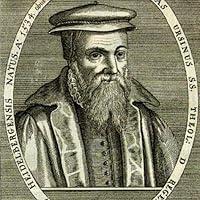
Zacharias Ursinus
Sobre o Autor
Zacharias Ursinus was a prominent theologian of the Reformation, best known for his role in the development of the Heidelberg Catechism. Born in 1534, he was educated at the University of Wittenberg, where he came under the influence of Martin Luther's teachings. His theological work emphasized the importance of catechetical instruction and the necessity of a concise and clear articulation of Christian doctrine, which he sought to achieve through the catechism he co-authored in 1563. Ursinus' contributions to Reformed theology have had a lasting impact, especially in the contexts of Protestant education and church practice.
Throughout his life, Ursinus faced various challenges, including opposition from both Catholic and Protestant factions. Despite these difficulties, he remained steadfast in his commitment to Reformed principles. His writings and teachings continue to resonate in contemporary discussions of Reformed theology and catechesis. Ursinus' legacy is preserved not only through the Heidelberg Catechism but also through his other theological works, which explore the depth of Reformed beliefs and their implications for faith and practice.